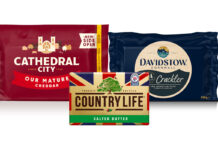Queen’s death can have business implications
Alison Bryce
Alison Bryce is a partner on the intellectual property and technology team at Dentons UK, based in Scotland.
There has been a lot of buzz about Royal Warrants recently, due to the passing of Her Majesty The Queen.
At Dentons, we’ve heard from many businesses that are concerned about the status of their own Royal Warrant, asking what happens when it sadly becomes void sooner than expected.
But why are businesses worried? A Royal Warrant of Appointment is the document that appoints a company or individual in a trading capacity to the Royal Household – and that entitles the holder of the Royal Warrant to use the Royal Arms in connection with their business.
It’s a royal stamp of approval, if you will. Many businesses feel that this encourages consumers to choose their brand over similar ones, as the Warrant is a sure sign of a quality product and a brand worth investing in. Notable brands favoured by the late Queen included Pringle of Scotland, Hunter Boots and, of course, Bollinger Champagne.
A Royal Warrant is usually granted for up to five years. It is reviewed in the year before it is due to expire, so that a decision can be made as to whether it should be renewed.
Once it has been granted, businesses can add the Royal Arms to packaging, stationery and advertising, as well as vehicles and buildings – but at a significant cost.
However, current Royal Warrants will become void due to the passing of Her Majesty The Queen.
There is time for organisations that are affected to act, according to the Royal Warrant Holders Association (RWHA).
Each company or individual may continue to use royal insignia in connection with the business for up to two years, provided there is no significant change within the company concerned.
In the UK, more than 650 businesses are impacted by this. Any organisation or brand that currently holds a Royal Warrant will have to reapply before the certification becomes void if they wish to renew their status under the new sovereign.
Meeting the two-year deadline is crucial. If you miss this, or are unsuccessful in your application, you need to update your branding and signage or risk several consequences that may put your brand’s reputation at risk.
If you continue to present yourself as having a Royal Warrant once it has become void, this could constitute an offence under statutory acts such as the Trade Descriptions Act 1968, the Trade Marks Act 1994 and, if dealing with consumers, the Consumer Protection from Unfair Trading Regulations.
More than that though, it would be a breach of trust between you and your customer, who trusts that brands will not attempt to mislead them.
If this trust is broken, you run the risk of contracts being rescinded, reputational damage and even financial risk.
In today’s competitive environment, trust is a priceless commodity. Don’t run the risk of losing it; take steps well ahead of time to reapply for your Royal Warrant.
And if, for whatever reason, it is not granted, protect yourself by removing it and its association from the business in good time.
If the product or service continues to meet the high standards which awarded the Royal Warrant in the first place however, it is likely to remain fit for a king.
Do you have a business, property or legal question or issue that you would like to know more about?
Contact Scottish Grocer and we’ll put it to an expert. Call Giles Blair on 0141 567 6074 or email giles.blair@peeblesmedia.com


















